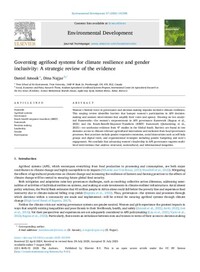Governing agrifood systems for climate resilience and gender inclusivity: A strategic review of the evidence

Authors:
Women's limited voice in governance and decision-making impedes inclusive climate resilience. This scoping review identifies barriers that hamper women's participation in AFS decision-making and assesses interventions that amplify their voice and agency. Drawing on two analytical frameworks—the women's empowerment in AFS governance framework (Ragasa et al., 2022) and the Reach-Benefit-Empower-Transform (RBET) framework (Quisumbing et al., 2023)—we synthesize evidence from 47 studies in the Global South. Barriers are found in two domains: access to climate-relevant agricultural innovations and exclusion from local governance processes. Best practices include gender-responsive extension, social innovations such as self-help groups and digital tools, and organizational strategies including gender budgeting and men's engagement. We conclude that advancing women's leadership in AFS governance requires multi-level interventions that address structural, sociocultural, and informational inequities.
